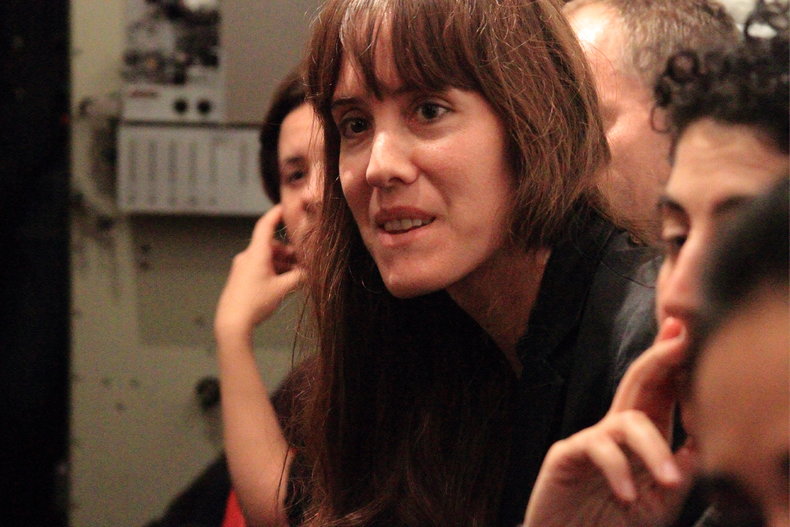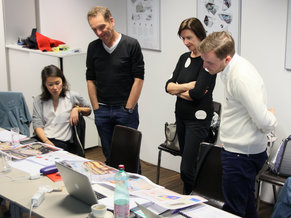
 |
A-Z | Popular | Blog | Encyclopedia | Search » |
|
Creative Things  Creative Process
Key Concepts
Journal Topics  Social Tension  Worldbuilding  Creative Feedback  Examples of Creative Processes  |
17 Examples of Ideation BrainstormingBrainstorming is the process of spitting out ideas without validation. For example, a design process that begins with everyone on the team suggesting their most far fetched ideas without fear of criticism.Reverse BrainstormingReverse brainstorming is the process of considering what could go wrong. Ideas generated with brainstorming can be later validated with reverse brainstorming. For example, an architectural team that comes up with a design for an earthquake resistant house that brainstorms a list of the design's weaknesses and risks.Preserving AmbiguityPreserving ambiguity is the theory that it is better not to make assumptions too early in an ideation process. For example, a student who is thinking about where to work after graduation who doesn't automatically assume they need to work for a large company.Creativity of ConstraintsThe theory that beginning with constraints increases the creativity of ideas. For example, an architectural team tasked with designing a house that is both extremely earthquake resistant and inexpensive.Creative TensionCreative tension is the idea that lively debate improves the creativity of groups. This would suggest that nations and organizations that value group harmony aren't as creative as those that embrace individualism and argument.Motley Crew PrincipleThe motley crew principle is the observation that extremely creative outputs are often the result of diverse contributors. For example, film crews that are composed of people with a broad range of backgrounds and talents.Challenging AssumptionsThe basic process of identifying assumptions, including your own, that may be blocking you from seeing broad ideas of value. For example, an oil company employee who challenges the assumption that their firm is an "oil" company and not an "energy" company that is free to produce clean energy.Divergent ThinkingDivergent thinking is the process of thinking about areas that have no "correct" answer. For example, planning your future whereby you are free to do anything.Failure of ImaginationFailure of imagination is the expectation that the future will resemble the past despite the fact that things constantly change. This is often seen in risk management whereby societies expect future risks to resemble recent problems even where new risks have become extremely obvious.IncubationTaking time to let your mind work on a problem. For example, a solution to a problem often appears after a break or a good night's sleep.Derivative IdeasThe process of taking existing ideas and changing them. In many cases, brilliance is an imperfect copy of something. For example, writers, musicians and artists may stumble upon extremely valuable and non-obvious ideas while trying to emulate their heroes.Inventive StepInventive step is the original thought of an individual that generates a non-obvious idea. Most ideas are obvious. It is somewhat rare to generate ideas that aren't obvious and these may seem obvious later in retrospect. For example, innovative film directors of one generation are often copied by the next generation of film makers such that later audiences may view brilliant films of the past as cliche.PlayCreative ideas often come when you are in a playful state of mind and those who have cultivated their ability to play are typically more creative than those who have become altogether serious.ImprovisationImprovisation is a common exercise for putting people into a more flexible state of mind that is conductive to creativity. This involves collaboratively building upon a shared story without ever rejecting the additions of others.First PrinciplesThe process of reducing things to their most basic truths, known as first principles. For example, an designer who uses the principle of least astonishment to find design ideas based on existing conventions that are intuitive to users.Thought ExperimentA thought experiment is an analogy that models a problem in order to simplify it or gain new insights. For example, a manager finds that an engineer always talks over the heads of others. As an exercise, they ask the engineer to think about how they would explain a complex system to a small child.SerendipitySerendipity is the observation that extremely valuable ideas can occur suddenly as if out of nowhere after struggling with a problem for a long period of time. For example, a mid-career professional who struggles with disinterest in their career who suddenly sees a way to a more satisfying career or lifestyle.Creative ProcessThis is the complete list of articles we have written about creative process.If you enjoyed this page, please consider bookmarking Simplicable.
BrainstormingA group creativity technique that encourages participants to spontaneously list out all their ideas without overthinking them.Problem Space
A definition of problem space with examples.
Creative ProcessesA definition of creative process with examples.Creative Feedback
The common elements of creative feedback.
Social Tension
The definition of social tension with examples.
Work Creativity
An overview of work creativity with examples.
UnlearningAn overview of unlearning with examples and discussion.ThinkingAn overview of thinking with examples.Melancholy
The definition of melancholy with examples.
I Think Therefore I Am
The four meanings of the phrase -- I think therefore I am.
Consciousness
An overview of consciousness with examples.
Us vs Them
An overview of us vs them with examples.
Opinions Examples
An overview of opinions with examples and comparisons.
Motivation Examples
An overview of motivation with examples.
Opinion Writing
An overview of opinion writing with examples.
Meaning
The definition of meaning with examples.
TrendingThe most popular articles on Simplicable in the past day.
New ArticlesRecent posts or updates on Simplicable. Site Map
Behavior
Branding Business Business Analysis Business Disadvantages Business Models Business Strategy Cities Color Theory Colors Communication Computing Creativity Culture Customer Experience Customer Service Data Decision Making Design Design Thinking Economics Education Engineering Governance More ...
© 2010-2023 Simplicable. All Rights Reserved. Reproduction of materials found on this site, in any form, without explicit permission is prohibited. View credits & copyrights or citation information for this page. |